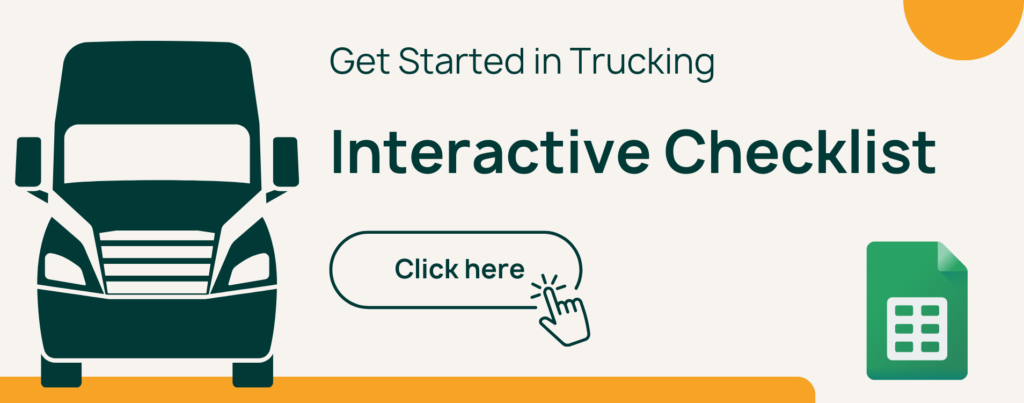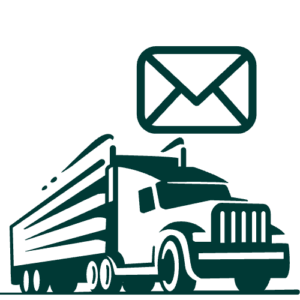Is it a good time to start a trucking business?
The best time to start a trucking business can depend on various factors, including overall economic conditions, market demand, and your own personal financial situation.
Many people have tried to time the trucking market, and predict when rates will go up or down, with little success. In fact, depending on when you read this article, the trucking market could have changed completely.
So instead of asking whether today (April 14, 2023, the date we’re writing this article) is a good time to start a business, we’re going to build a framework you can use any time to know if the decision is right for you.
The information in this article will help you answer these questions:
- Is it a good time for trucking?
- Is it a good time for the economy, generally?
- Is it a good time for me? (Spoiler: this is the MOST important question!)
Leer este artículo en español.
Is it a good time for trucking?
Trends, not “trendy”
Believe it or not, the best time to start your company is not necessarily when rates are at their highest nationwide. This is often when you start to see people bragging about their rates per mile on social media.
But just because you read something on Facebook, doesn’t mean it’s true or that it will be true for you!
Instead, take a more strategic approach: do your own freight market research looking at multiple years of data, taking into consideration what you plan to haul and the geographical areas where you plan to drive.

In a previous article, we looked at the many factors that impact the freight market. We’ll summarize the three main cycles in the trucking industry here:
Seasonality
Generally, January – March is the slowest time of year in trucking. The weather is terrible and the holiday season has ended.
Things typically start to pick up in April when produce becomes more readily available. August – October is known as peak season.
The market starts to slow down again in November, though there is still plenty of freight for last-minute holiday shoppers and end-of-year orders.
If you’re trying to time the seasonality of the market, generally, it’s a good idea to plan to start hitting the road around April.
If you plan to haul a specific seasonal item, your business’s seasonality may look very different. Seasonal cycles may be different depending on your location as well. Again, look at these trends over multiple years to find the right time to enter the market.
Tender rejections
In the trucking industry, the contract market refers to agreements between shippers and carriers for the transportation of goods over a specified period at a set price.
For more on the difference between the spot and contract markets, read our article on how to find loads for new trucking companies.
Carriers may decide to reject contracted loads for two reasons: they don’t have enough capacity or they found something paying better. When a load gets rejected, it ends up on a load board.
The tender rejection rate is the proportion of contracted loads that are being rejected by carriers. When this rate is high, it means carriers are finding better rates outside their contracts. When it is low, carriers are holding onto contracted freight in large part because outside rates have fallen.
Keeping an eye on tender rejections, particularly in your state and region, can help you understand how much carriers have in the way of negotiating power.
Market capacity
When rates are high, more trucking companies enter the market and put more trucks on the road. This increases supply, driving down rates. When rates decrease, trucking companies downsize or leave the market, taking trucks off the road.
To know how many more trucks will be added to the market in the near future, you can keep an eye on trends in truck orders and the number of new operating authorities granted by the FMCSA.
Is it a good time for the economy?
If you think timing the trucking market is hard, predicting what will happen in the overall economy is even harder! But there are some key economic indicators that impact the trucking market significantly:
- Interest rates: low-interest rates are good news for new trucking business owners because you’re likely taking on debt to make large purchases for trucks and equipment.
- Consumer spending: the more people buy, the more loads there are to haul.
- Construction: when new construction is on the rise, there will be more demand for trucks.
- Inventory-to-sales ratio: this is a measure of how many months of merchandise stores have on the shelves. High inventory means they’re having a hard time selling products and thus, lower demand to get more products.
- PMI Index: this is a measurement of manufacturing activity with more than 50% indicating growth and less than 10% indicating a contraction of the industry. When more items are being manufactured, there are more loads to haul.
Looking at these indicators may lead you to believe that you should not start a trucking business in a recession. However, if you have the financial situation to do so, starting your company during a recession can position you to ride the recovery wave back up.
In fact, truck prices are often at their lowest point in a recession, so can be a strategic time to start.
Is it a good time for you?
Think about your own personal circumstances in four main areas:
- Finances: do you have the startup capital you need to set up your business for success?
- Business knowledge: do you understand how to run a small business, including your legal and financial responsibilities?
- Industry experience: have you had time to really know your equipment and the market?
- Mindset: are you getting into the business for the right reasons?
Remember that starting a trucking business is not easy, and timing the market perfectly is impossible. You now have a framework to evaluate if starting a trucking business is the right decision for you.
By analyzing trends and taking a strategic approach to your research, you can decide if the market, the economy, and your personal circumstances are conducive to starting a trucking business.
Keep in mind that running a successful trucking business requires dedication, knowledge, and experience in the industry, so take the time to evaluate all factors before jumping in.
Regardless of when you start your trucking business, you’re going to need strong cash flow to keep up with all your expenses: fuel, insurance, maintenance, etc. Factoring is a financial tool that pays your invoices quickly so you can stay on the road.

Article By
Keep Learning












